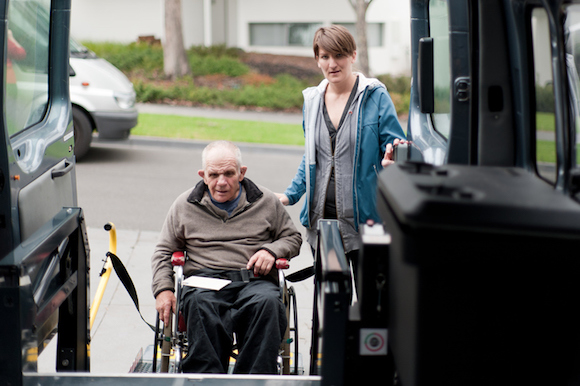When Lauren Bond moved her 75-year-old father, who had mild dementia, 1,000 miles from Charlottesville, VA, to a long-term care facility near her home in Overland Park, KS, she wanted to closely monitor his care.
“He would need long-term care for the rest of his days,” says Bond, a registered nurse and director of client services for Care is There, a geriatric care management company. “We moved him because we felt strongly that he needed an advocate nearby while he was in long term care.”
Bond flew the distance on an airline with her dad.
“Since I’m an RN, I felt okay doing this but others might want to hire a nurse or other support person,” says Bond.
Another family member loaded an SUV with her father’s important possessions and drove them across the country to Bond’s home.
Some parental relocations are more complicated, though. Due to health problems, not every aging parent can fly, and some won’t fare well in a regular vehicle. Fortunately, there are many options for moving an aging parent a long distance.
Before you move Mom or Dad across the country, read these tips for a smoother transition.
1. Fly Nonstop.
Bond booked a nonstop flight to shorten travel time. If your parent is physically able to fly but no nonstop flight is available, book a direct flight, which has a stop but no plane change. The less stress, walking or wheelchair navigation at the airport, the better.
2. Consider Hiring a Care Manager.
Bond recommends using a care manager, a professional who coordinates care and services for older adults, for both ends of the move. They’ll know the local resources, and if your parent needs advanced medical support during the move, a care manager can find and arrange it. The care manager can also communicate with family members and healthcare professionals, get your parent set up with new doctors and pharmacies, arrange movers to unpack and refer you to elder law attorneys, financial planners and social services agencies.
3. Check Out Specialty Medical Transport.
Joy Loverde, author of Who Will Take Care of Me When I’m Old?, moved her 85-year-old mom, along with her mother’s 84-year-old husband, Bill, who’d had a stroke, from Port Charlotte, FL, to Chicago. Loverde’s mother was able to fly but Loverde hired a specialty medical transport bus to drive Bill 1,300 miles.
“It was enormous, the size of a rock star tour bus,” says Loverde. “It had a bed, an RN and two drivers.”
The transport service was pricey: $12,000.
“We chose this option, even though it was extra expensive, because the staff could handle him, and it gave my mom peace of mind,” says Loverde.
Don’t forget to check your options. The cost of your long distance medical transport could be reduced by getting quotes from multiple companies. Jitterbug Travel Medical offers a similar long distance medical transport experience for only $6,500 – $8230. They didn’t exist when Loverde’s move happened so you never know when the marketplace will improve.
4. Using Non-Specialty Transport.
Make sure the van or car drivers are trained for transporting older adults with physical limitations.
“We’re specially designed to transport people with extra needs such as oxygen tanks or wheelchairs,” says Lindsay Tsai, director of client growth at RoundTrip, a non-emergency medical transportation company. Prices for non-specialty transport vary greatly, depending on distance and services needed.
5. Hire a Companion for the Trip.
When Karen Koenig and her husband moved Karen’s mother, who is blind, from Massachusetts to Florida, Koenig hired a woman to stay over at her mom’s apartment the night before the move and the night of their arrival in Florida.
“It made all the difference to our mental health and my mother’s,” says Koenig.
6. Do it Yourself.
Dan Nelson rented a U-Haul truck and enlisted a friend’s help to move his 84-year-old father 600 miles from McMinnville, OR, to Danville, CA.
“The hardest part was his medication,” says Nelson, who contacted his dad’s primary care physician’s office first and obtained a list of his medications so he could cross-check with the ones provided by his dad’s assisted living facility.
7. Look into Health Insurance and Pensions.
Check on whether your parent’s health insurance coverage, pension benefits and legal documents will be affected by a move to another state. Consult an elder law attorney to review trusts and other legal documents to ensure they conform with state laws.



